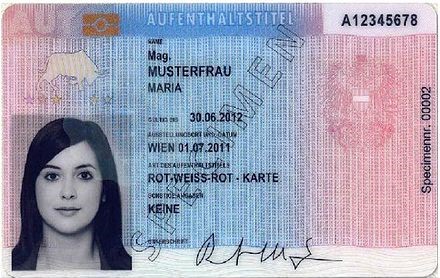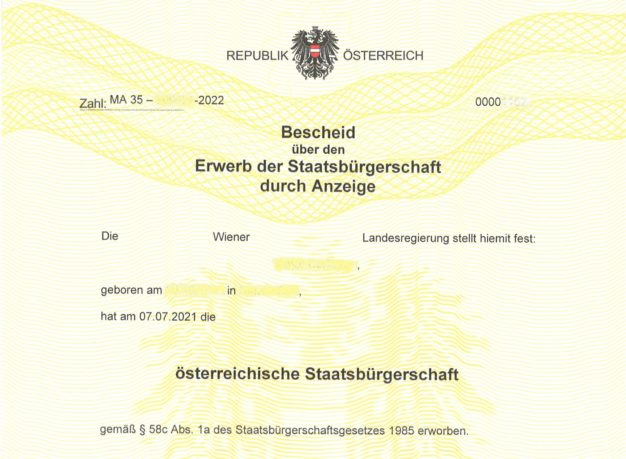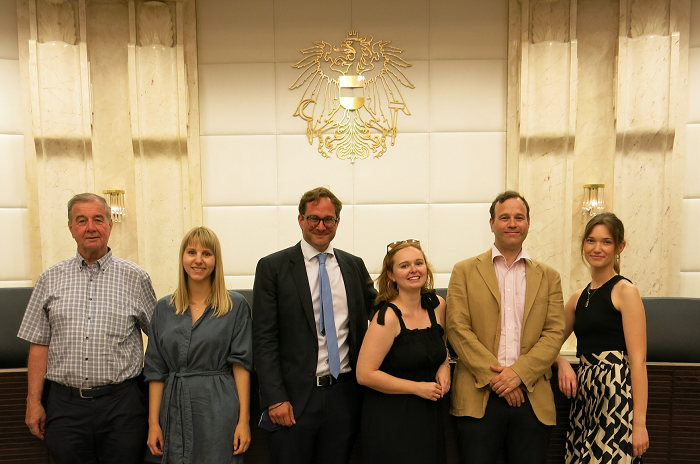The Austrian Citizenship Act provides the possibility for descendants of victims of National Socialism to obtain Austrian citizenship by filing a complaint. Already several thousands of descendants, for example of Holocaust survivors, have obtained Austrian citizenship in this way. The Austrian legislator has now included further groups of persons in the circle of those entitled to citizenship in order to eliminate cases of hardship.
Naturalization for descendants of victims of National Socialism
Persons persecuted by the NSDAP for political, religious or other reasons during the so-called “Third Reich” and their descendants already had the possibility to obtain Austrian citizenship in a privileged way by notification according to § 58c StbG. The Austrian Ministry of Foreign Affairs and the Ministry of the Interior provided comprehensive information about the legal situation and thus helped to inform affected persons about the possibility of obtaining Austrian citizenship by means of notification (link Federal Ministry of Foreign Affairs, link Federal Ministry of the Interior).
Notifications could also be filed with Austrian embassies abroad (link Federal Ministry of Foreign Affairs).
Several thousands of new citizenships
The competent Austrian authority, i.e. the Viennese provincial government (Magistratsabteilung 35, or “MA35” for short) has already applied this provision many times. Numerous descendants of victims of National Socialism have since made use of this possibility. Several thousand descendants of victims of National Socialism from all over the world have applied for and received Austrian citizenship in this way.
The Austrian media have reported extensively on the successful procedures before the citizenship authority
(daily-newspapers articles of Der Standard, 29 August 2021, Der Standard, 20 Mai 2022, Kurier, 29 August 2021).
Retention of existing citizenship (dual citizenship)
Claimants are allowed to retain their current citizenship, e. g. the US or Israeli citizenship. This legal situation creates an exception to the fundamental ban of dual citizenship in the Austrian Citizenship Act (StbG).
Extension of the eligible group of persons to include descendants of persons who did not have a principal residence in the territory of the Federal Republic of Austria prior to their flight
Through the recent amendment to the Citizenship Act, Federal Law Gazette I 48/2022 (link Federal Law Gazette), the Austrian legislator has attempted to eliminate cases of hardship and objectively unjustified differentiations between different groups of descendants of victims of National Socialism.
Due to the narrow wording of the scope of application, so far only descendants of Austrian citizens who had their main residence in Austria before the expulsion were entitled to claim. This legal situation led to cases of hardship. Especially descendants of Holocaust-survivors who were abducted and encamped in Austria could not apply under this citizenship program. For example, the authorities negated the existence of a principal residence in cases where the persecuted ancestors were deported to Austria during the Second World War and interned in concentration camps here.
Precautions against unfair hardships
The Austrian legislator has addressed these cases of hardship and expanded the scope of the acquisition of Austrian citizenship by notification: Thus, descendants of persecuted persons who were Austrian citizens and did not have a main residence in the Austrian federal territory can now also acquire Austrian citizenship by notification. They have to proof that they were threatened by persecution by organs of the NSDAP or the authorities of the German Reich in the case of a return or even in case of their first entry into the federal territory of Austria.
This applies, for example, to descendants of persons who were persecuted by the National Socialists on account of their faith, their political views or for other reasons and who held Austrian citizenship. If they had not lived in what is now the federal territory of Austria before their escape but in one of the other successor states to the Austro-Hungarian Monarchy, for example in what is now the Czech Republic, Slovakia, Romania, Hungary or Western Ukraine, they are eligible for citizenship, given that they were prevented from returning to the territory of present-day Austria or entering Austria for political reasons.
The amendment to the Citizenship Act was published in the Federal Law Gazette I 48/2022 (link Federal Law Gazette). The new legal situation with the expanded group of eligible persons has been in force since 14 February 2022.
Evaluation of the facilitations in naturalization
The change in the legal situation is to be welcomed. The expansion of the scope of award of citizenship by notification for descendants of persons persecuted under National Socialism represents a further contribution to the elimination of historical injustice and reparation.
It remains to be seen whether proceedings conducted under the old legal situation and concluded negatively, in which the authority (Magistratsabteilung 35, or “MA35” for short) denied the acquisition of citizenship by notification, will be resumed as a result of the change in the legal situation.
We have already assisted numerous clients in obtaining Austrian citizenship on the basis of the Citizenship Act and the special regulations for descendants of persons persecuted under National Socialism.
Please contact us if you need support, advice and representation in proceedings for the granting of Austrian citizenship or for obtaining Austrian citizenship by notification pursuant to Section 58c of the Austrian Citizenship Act (StbG).









